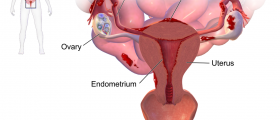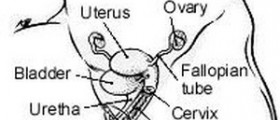
Endometriosis may cause many problems, including some excruciating ones before and during menstrual periods and also during and after sexual intercourse. The affected women may also experience heavy bleeding during periods or even between their periods, infertility, nausea, bloating, bowel problems, fatigue and other symptoms associated with this condition.
Doctors explain that endometriosis is actually caused by endometrial tissue which starts to grow outside its normal place, usually in the fallopian tubes, ovaries or other organs in the abdominal cavity. As the woman experiences normal monthly fluctuation of hormones and her period, this misplaced tissue also starts to bleed, causing sometimes seriously bothersome pain and other problems.
Endometriosis treatment may include several approaches, such as observation with no medical intervention, hormone treatment, surgery, as well as a combination of treatments and some complementary therapies.
Observation and Hormone Treatment for Endometriosis
In patients whose endometriosis is mild, doctors may not need to intervene in any way and recommend only regular check-ups. In case these patients start to experience any pain because of endometriosis, they could use ibuprofen, Mefenamic acid or some other non-steroidal anti-inflammatory drugs (NSAIDs). Mild endometriosis may progress and become more serious problem, so visit your doctor if the symptoms become worse.
As mentioned earlier, endometrial cells always respond to hormonal changes in the body, regardless the location and this is why even misplaced endometrial tissue starts to bleed after increase of estrogen and progesterone levels in the body.
Hormone therapy, therefore, may be efficient in management of endometriosis and doctors may prescribe dydrogeterone, danazol, gestrinone, GnRH (gonadotropin releasing hormone) agonists, Medroxyprogesterone acetate or even contraceptive pills for this purpose. However, always discuss this treatment thoroughly with your doctor and check for all side effects which may appear during hormone therapy.Endometriosis Surgery
Laparoscopic surgery is a very common diagnostic procedure for endometriosis, but it can also be used to remove endometrial cysts, implants or adhesions in the abdominal cavity. In most cases this abnormally placed endometrial tissue is cut out, but sometimes it can also be vaporized or burned down.
Rarely endometriosis patients may have an open surgery such as laparotomy or bowel resection, if adhesions develop on the bowels. Additionally, patients may need hysterectomy (surgical removal of the uterus and all implants, cysts and adhesions and sometimes even fallopian tubes). Even then, some women may still experience pain and other problems.
Other Treatments
In some cases, doctors may recommend a combination of surgery and hormone therapy, before or after the surgical procedure. Women suffering from endometriosis could also experience great relief by using herbal and homeopathic remedies, Chinese medicine or acupuncture. Just make sure to inform your doctor about the treatment you have opted for.
Some believe that pregnancy will cure their endometriosis. It might be true, but only for some of these patients, while others experience recurring or even worse symptoms than before.

















Your thoughts on this
Loading...